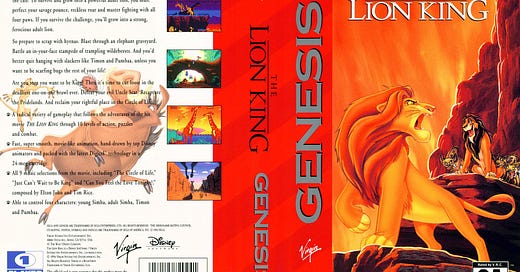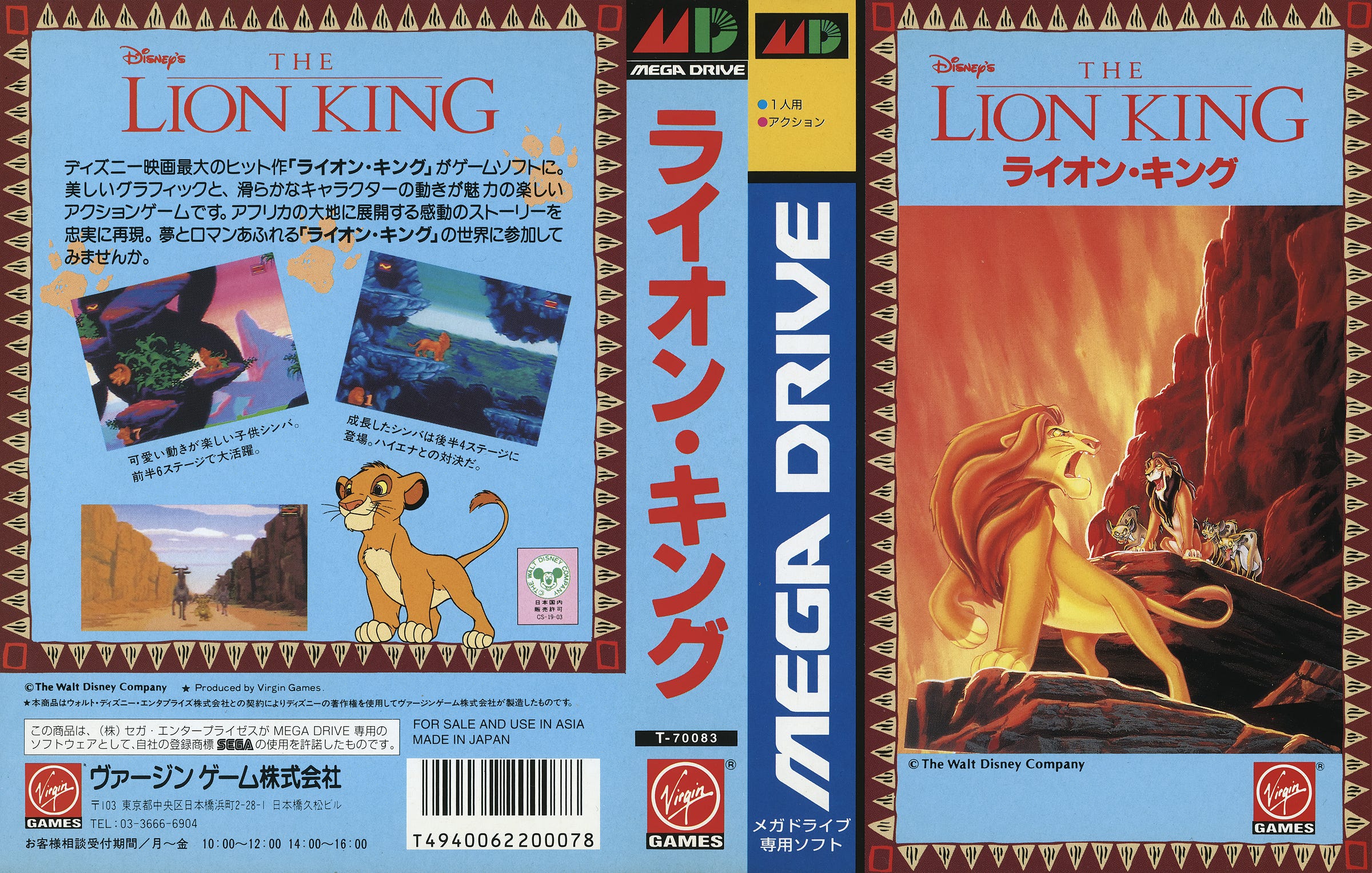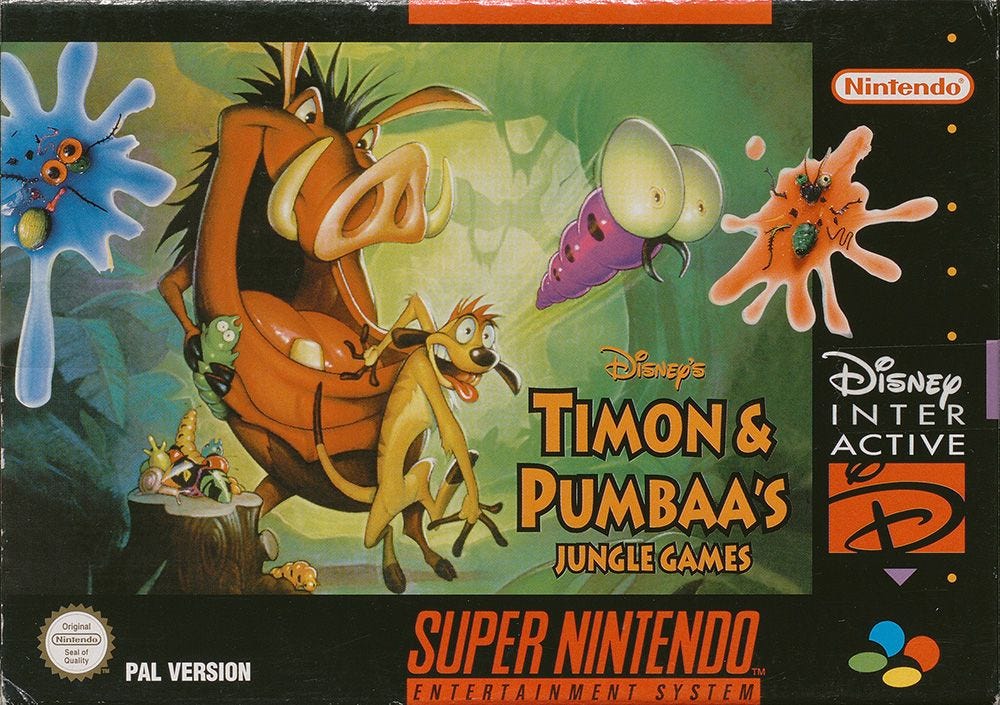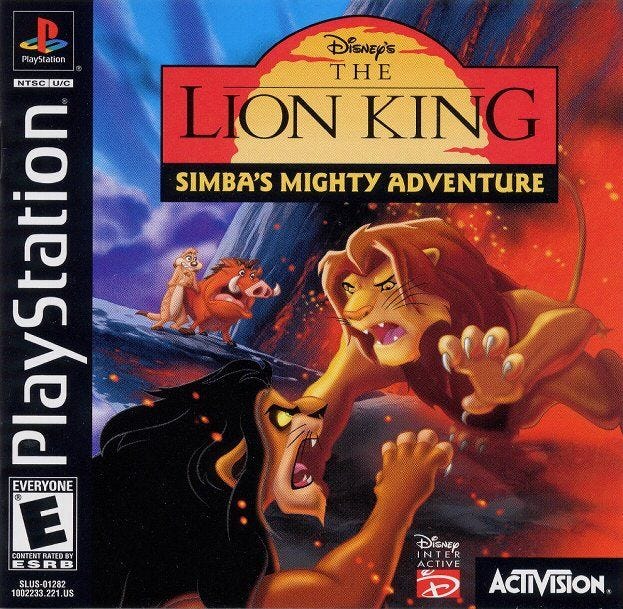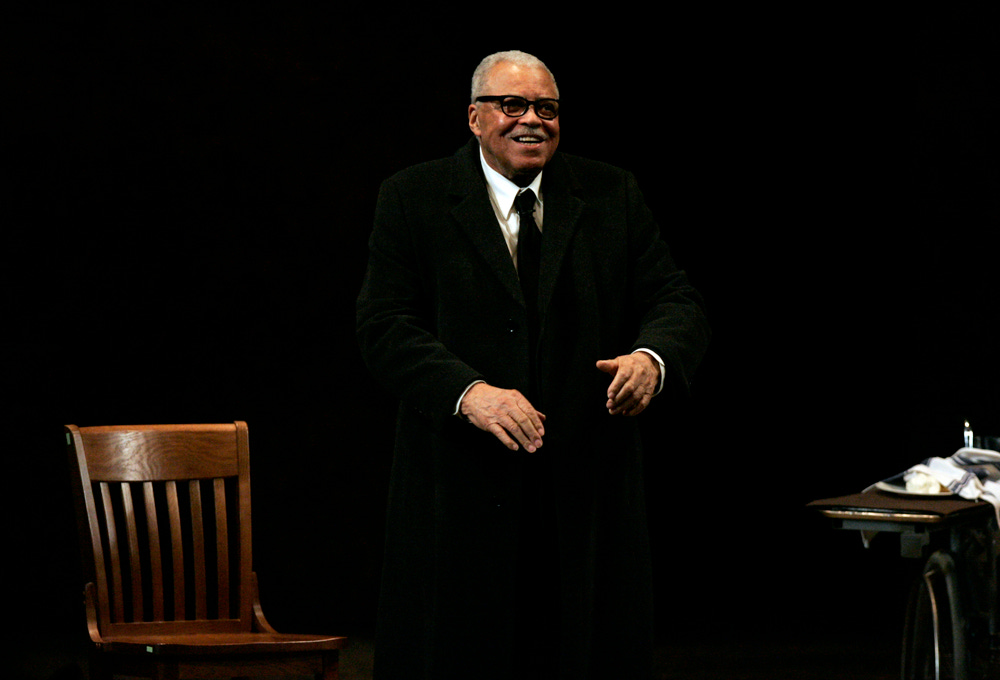
I’m Cory Roberts, the king of the Pride Lands1, and this post pays tribute to James Earl Jones (Jan. 17, 1931 — Sep. 09, 2024). Many of us remember him in the various Bell Atlantic (later Verizon) commercials, Mufasa from The Lion King, and Darth Vader in Star Wars films. Today we’ll be reviewing the Lion King games. I know that this newsletter on Substack does not review Sega Genesis2 or Super Nintendo3 video games, and…
…okay, easy there, Mufasa (Shinya Owada in the Japanese dub), I’m reviewing video games AND paying tribute to your voice actor…
The Lion King
Developed by Westwood Studios (Mega Drive/Genesis and SFC/SNES), East Point Software (DOS), Syrox Developments (Master System and Game Gear), and Dark Technologies (Game Boy and Famicom/NES)
Published by Virgin Interactive Entertainment
Platforms are SFC/Super NES, Mega Drive/Genesis, MS-DOS, Amiga, Game Gear, Master System, Game Boy, NES
Released between late 1994 and early 1995 (including the Japanese release)
Composers are Frank Klepacki, Dwight Okahara, John Wright, Zack Bremner, and Patrick Collins for the SFC/Super NES; Matt Furniss for the Mega Drive/Genesis; RollerCoaster Tycoon composer Allister Brimble for the MS-DOS and Amiga; Kevin Bateson for the Game Boy and the Famicom/NES
The first order of business is Lion King for the Sega Genesis (pictured), a platform game based on Disney's 1994 animated film of the same name. Many of us grew up with this version when we had a Sega Genesis. The game follows Simba’s (Jonathan Taylor Thomas — cub; Matthew Broderick — adult; Tatsuya Nakazaki — cub, Japanese dub; Mitsuru Miyamoto — adult, Japanese dub) journey from a young cub to the battle with his uncle Scar (Jeremy Irons; Haruhiko Jō in the Japanese dub) as an adult.
The Lion King is a side-scrolling platform game in which players control the protagonist, Simba, through the events of the film, going through both child and adult forms as the game progresses. In the first half of the game, players control Simba as a cub, who primarily defeats enemies by jumping on them. Simba's roar consumes a replenishable meter, and can be used to stun enemies or solve puzzles. In the second half of the game, Simba becomes an adult and gains access to various combat moves such as scratching, mauling, and throws. Simba starts the game with a certain number of lives, depending on the difficulty setting, which are lost if he runs out of health, falls into a bottomless pit, or a lake of water or lava, or is hit by a rolling boulder. Passing through checkpoints throughout the level allow Simba to restart the level from that point when he loses a life. The game ends prematurely when the player loses all of their lives, although they can continue playing from the current level as long as they have saved the game.
Westwood Studios, the game’s developer, was merged into EA Los Angeles in 2003 (which was later dissolved ten years later and succeeded by EA Digital Illusions CE AB). Virgin Interactive Entertainment (later Avalon Interactive Group, Ltd.), the game’s publisher, was shuttered in 1998 (2005 in the case of the UK branch).
Timon & Pumbaa’s Jungle Games
Developed by 7th Level (PC and Mac) and Tiertex Design Studios (SFC/SNES)
Published by THQ (SFC/SNES) and Disney Interactive (PC and Mac)
Platforms are Windows, Classic Mac OS, and Super NES
Released in 1995 for the Windows, 1996 for the Macintosh, and 1997/1998 for the SFC/SNES
No Japanese release for this game
The next one up is Timon & Pumbaa's Jungle Games, a 1995 party video game developed by 7th Level and published by Disney Interactive Studios. This was before Mario Party for the N64 took the world by storm. A Super Nintendo Entertainment System port, developed by Tiertex and published by THQ, was released in North America and PAL territories in November 1997 and March 1998, respectively. It can be installed on Windows 3.1, 95, 98, or later, but was added to Windows Me and later on Windows XP; the game gained popularity after its inclusion in the latter.
Tiertex, the game’s developer for the SNES, went belly up in mid-2021, after being dormant for nearly 18 years. 7th Level, the game’s developer for the PC and Mac, announced their intention to merge with Pulse Entertainment to create P7 Solutions on November 17, 1997, before shuttering in 1998. THQ, the game’s publisher for the SNES, went belly up in early 2013, and Disney Interactive Studios, the game’s publisher for the PC and Mac, went belly up in mid-2016.
Simba’s Mighty Adventure
Developed by Paradox Development (later Midway Studios Los Angeles, shuttered in 2008)
Published by Activision Publishing, Inc.
Platforms are PlayStation and Game Boy Color
Released on Christmas Day 2000 in North America and early 2001 in Europe
No Japanese release for this game
After The Lion King 2: Simba's Pride4 was released in theatres on Halloween 1998, there was The Lion King: Simba's Mighty Adventure. Unlike the previous The Lion King video game, it adhered more closely to the events in the film, and the storyline carried on into the said second film, with Simba having to battle his evil uncle Scar, rescue his daughter Kiara (the protagonist from The Lion King II: Simba's Pride — Michelle Horn — cub; Charity Sanoy — cub singing voice; Neve Campbell — adult; Liz Calloway — adult singing voice; Shuka Takano — cub, Japanese dub; Aiko Sato — adult, Japanese dub; Aki Sakaguchi — adult singing voice, Japanese dub), and finally battle Zira.
Due to the PlayStation console's 3D graphics capabilities, the gameplay became slightly more varied. Simba's capabilities are identical to the first The Lion King video game in which he can roar, leap, roll, and run. In the PlayStation version, voices, music, and sound effects from the film were used. Clips from the films are placed between levels although many of the lines were redubbed by other Lion King-related actors, including but not limited to Cam Clarke, Jim Cummings, and Kevin Schon.
Thanks, James Earl Jones, for giving us the Mufasa (Darth Vader, in the case of Star Wars) impression over these years.
I also thank you for reading. Don’t forget to subscribe!
Cory out.
The author is not.
Mega Drive for those who live outside of North America.
Super Famicom for those who live in Japan.
Known as The Lion King 2: Simba's Kingdom in some countries and ライオン・キング2 シンバズ・プライド in Japan.


